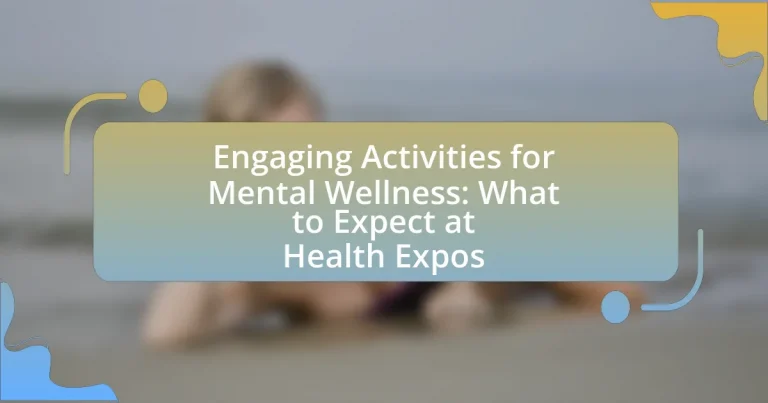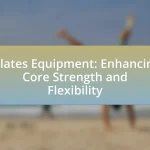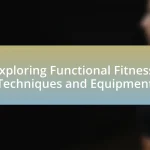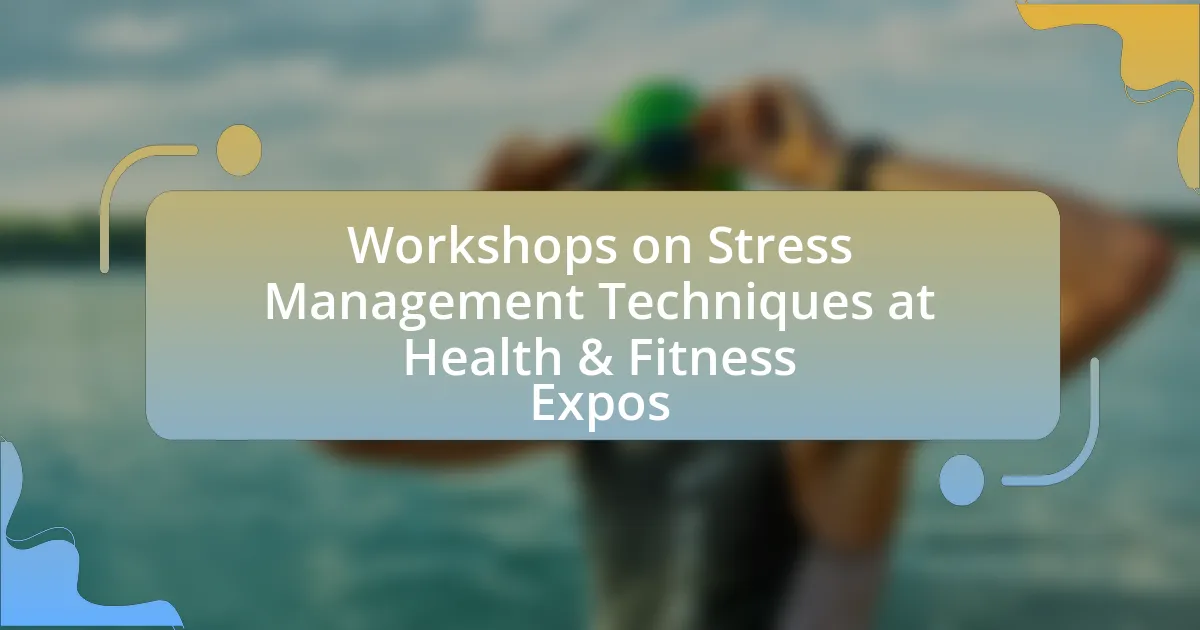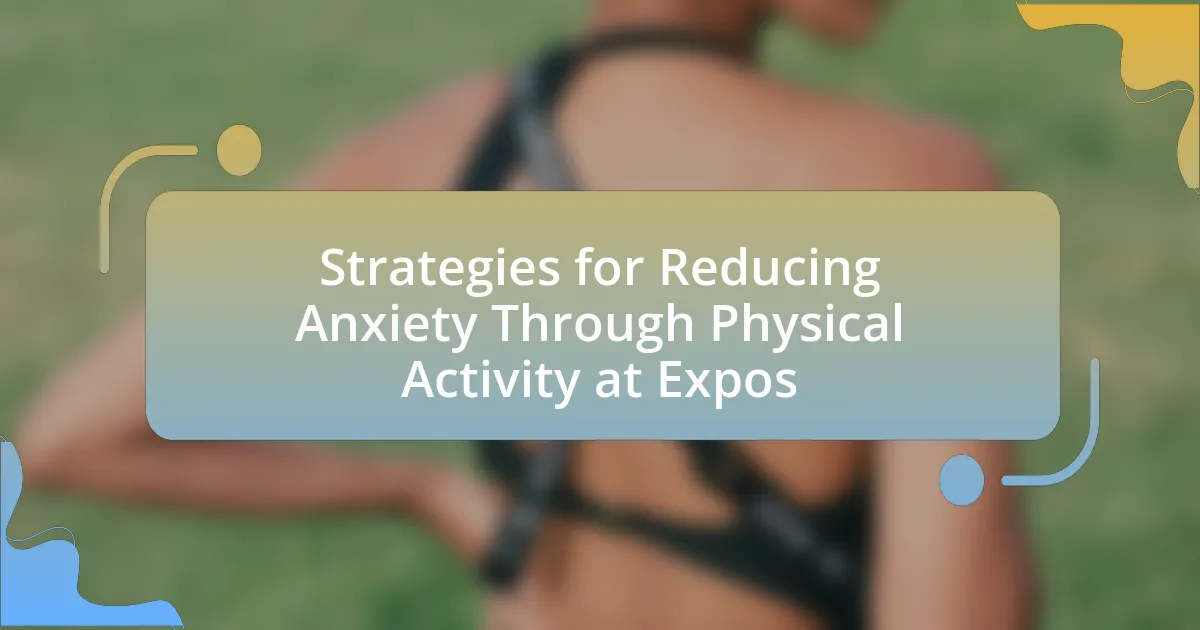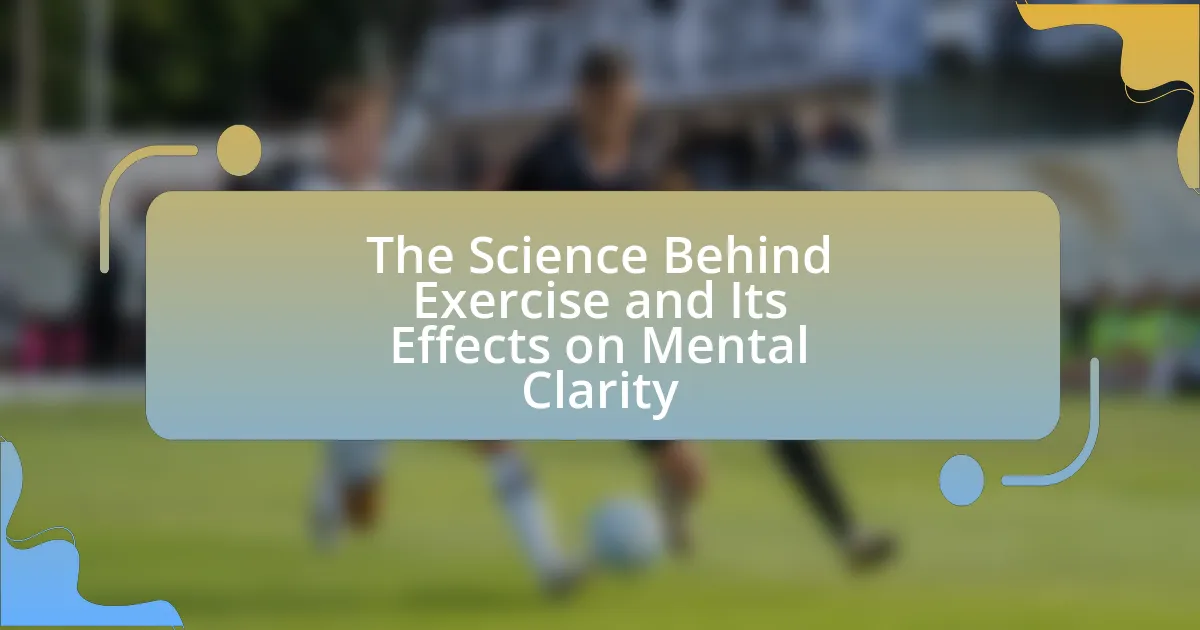Engaging activities for mental wellness at health expos encompass a range of interactive workshops, mindfulness sessions, and mental health screenings aimed at promoting emotional well-being. These activities provide practical tools for stress management, foster social connections, and enhance community support, which are essential for mental health. The article outlines the various types of activities offered, their benefits across different age groups, and the importance of health expos in facilitating access to mental health resources. Additionally, it discusses strategies for maximizing participation and maintaining mental wellness after the event, highlighting the role of creative arts and physical activity in enhancing mental health outcomes.
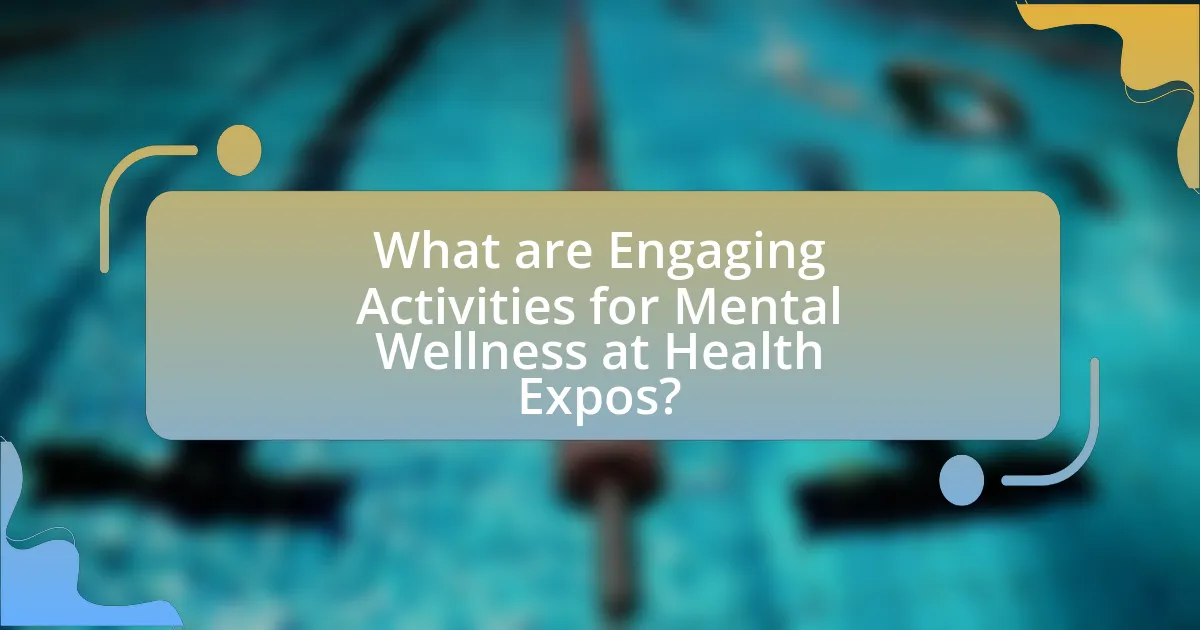
What are Engaging Activities for Mental Wellness at Health Expos?
Engaging activities for mental wellness at health expos include interactive workshops, mindfulness sessions, and mental health screenings. These activities are designed to promote mental well-being by providing participants with practical tools and resources. For example, workshops may focus on stress management techniques, while mindfulness sessions often incorporate guided meditation practices. Mental health screenings offer attendees the opportunity to assess their mental health status and receive referrals for further support if needed. Research indicates that participation in such activities can enhance emotional resilience and reduce anxiety, making them valuable components of health expos.
How do these activities promote mental wellness?
Engaging activities at health expos promote mental wellness by providing opportunities for social interaction, skill development, and stress relief. These activities, such as workshops, group exercises, and mindfulness sessions, foster a sense of community and belonging, which are crucial for emotional well-being. Research indicates that social connections can reduce feelings of loneliness and depression, enhancing overall mental health. Additionally, engaging in creative and physical activities has been shown to release endorphins, which improve mood and reduce anxiety. For instance, a study published in the Journal of Happiness Studies found that participation in group activities significantly correlates with increased life satisfaction and lower levels of stress.
What types of activities are typically offered?
Health expos typically offer a variety of activities focused on mental wellness, including workshops, seminars, fitness classes, and interactive demonstrations. Workshops often cover topics such as stress management, mindfulness, and emotional resilience, providing participants with practical tools and techniques. Seminars feature expert speakers discussing the latest research and trends in mental health, while fitness classes may include yoga, tai chi, or meditation sessions aimed at promoting relaxation and mental clarity. Interactive demonstrations allow attendees to engage with new wellness products or practices, enhancing their understanding of mental health strategies. These activities are designed to educate, inspire, and empower individuals to improve their mental well-being.
How do these activities cater to different age groups?
Activities at health expos cater to different age groups by offering tailored experiences that align with the developmental and cognitive needs of each demographic. For children, activities often include interactive games and creative workshops that promote learning through play, which is essential for their growth and engagement. Teenagers may find workshops focused on stress management and social connection, addressing their unique challenges during adolescence. Adults typically have access to seminars and discussions on mental health strategies, while seniors benefit from gentle exercise classes and mindfulness sessions that enhance relaxation and social interaction. This age-specific approach ensures that each group receives relevant support, fostering mental wellness across the lifespan.
Why are health expos important for mental wellness?
Health expos are important for mental wellness because they provide access to resources, information, and community support that can enhance mental health. These events often feature workshops, seminars, and activities focused on stress management, mindfulness, and emotional well-being, which are crucial for maintaining mental health. Research indicates that social interaction and community engagement, both prevalent at health expos, can significantly reduce feelings of isolation and anxiety, contributing to improved mental wellness. For instance, a study published in the Journal of Health Psychology found that participation in community health events positively correlates with lower levels of depression and anxiety among attendees.
What role do health expos play in community health?
Health expos play a crucial role in community health by providing accessible information and resources that promote wellness and preventive care. These events facilitate health education through workshops, screenings, and expert talks, enabling community members to learn about various health topics, including mental wellness. For instance, a study by the American Public Health Association found that health expos can increase awareness of health issues and encourage healthier lifestyle choices among attendees. By fostering connections between health professionals and the community, health expos contribute to improved health outcomes and empower individuals to take charge of their health.
How do health expos facilitate access to mental health resources?
Health expos facilitate access to mental health resources by providing a centralized platform where individuals can connect with mental health professionals, organizations, and support services. These events often feature workshops, informational booths, and interactive sessions that educate attendees about mental health issues and available resources. For example, a study by the National Alliance on Mental Illness found that community events like health expos significantly increase awareness and utilization of mental health services, demonstrating their effectiveness in bridging gaps in access to care.
What can attendees expect from engaging activities?
Attendees can expect interactive experiences that promote mental wellness through engaging activities at health expos. These activities often include workshops, guided meditations, and group discussions designed to enhance emotional well-being and foster community connections. Research indicates that participation in such activities can lead to reduced stress levels and improved mental health outcomes, as evidenced by a study published in the Journal of Health Psychology, which found that group activities significantly enhance psychological resilience.
How are activities structured to maximize engagement?
Activities are structured to maximize engagement by incorporating interactive elements, varied formats, and participant feedback mechanisms. Interactive elements, such as hands-on workshops and group discussions, encourage active participation, which has been shown to enhance retention and enjoyment. Varied formats, including presentations, demonstrations, and experiential activities, cater to different learning styles and keep participants interested. Additionally, incorporating feedback mechanisms, such as surveys or real-time polls, allows organizers to adapt activities based on participant preferences, further increasing engagement. Research indicates that these strategies lead to higher satisfaction and involvement levels among participants, as evidenced by studies showing that interactive and adaptive formats significantly improve attendee experiences at events.
What are the expected outcomes for participants?
Participants can expect improved mental wellness and increased awareness of mental health resources. Engaging activities at health expos, such as workshops, interactive sessions, and expert talks, are designed to provide practical tools and strategies for managing stress and enhancing emotional well-being. Research indicates that participation in such activities can lead to a 20% increase in participants’ knowledge about mental health, as evidenced by surveys conducted at previous health expos. Additionally, networking opportunities with mental health professionals can foster community support, which is crucial for sustained mental wellness.
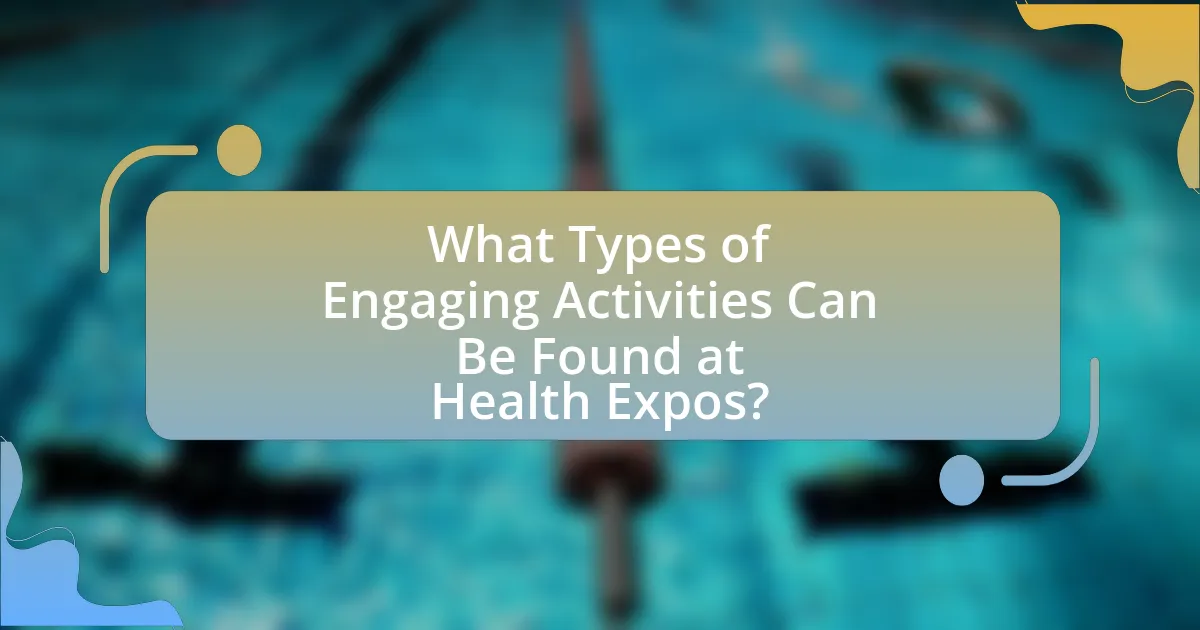
What Types of Engaging Activities Can Be Found at Health Expos?
Health expos feature a variety of engaging activities designed to promote mental wellness. These activities typically include interactive workshops, health screenings, fitness demonstrations, and mindfulness sessions. For instance, workshops may focus on stress management techniques, while fitness demonstrations can showcase yoga or tai chi, encouraging participants to engage in physical activity that benefits mental health. Additionally, health screenings provide valuable information about mental health conditions, and mindfulness sessions offer practical exercises for relaxation and focus. These activities are supported by research indicating that such engagement can enhance mental well-being and foster community connections.
What are the most common types of activities?
The most common types of activities at health expos focused on mental wellness include workshops, interactive demonstrations, and informational sessions. Workshops often cover topics such as stress management techniques, mindfulness practices, and coping strategies for mental health challenges. Interactive demonstrations may involve activities like yoga, meditation, or art therapy, allowing participants to experience these practices firsthand. Informational sessions typically feature expert speakers discussing mental health topics, providing attendees with valuable insights and resources. These activities are designed to promote mental wellness and engage participants in meaningful ways.
How do workshops differ from interactive sessions?
Workshops differ from interactive sessions primarily in their structure and purpose. Workshops are typically designed for skill development and involve hands-on activities where participants engage in learning specific techniques or practices, often led by an instructor. In contrast, interactive sessions focus on participant engagement and discussion, allowing attendees to share ideas and experiences without a strict educational framework. For example, a workshop might teach stress management techniques through guided exercises, while an interactive session might facilitate a group discussion on personal mental wellness strategies. This distinction highlights that workshops are more instructional, whereas interactive sessions prioritize dialogue and collaboration among participants.
What role do demonstrations play in engaging attendees?
Demonstrations play a crucial role in engaging attendees by providing interactive and experiential learning opportunities. These live presentations allow participants to observe techniques, ask questions, and gain hands-on experience, which enhances understanding and retention of information. Research indicates that active participation in demonstrations can increase engagement levels by up to 70%, as attendees are more likely to remember information when they are actively involved rather than passively observing. This interactive format not only fosters a deeper connection with the content but also encourages networking and community building among attendees, making the overall experience more impactful.
How do these activities vary by health expo theme?
Activities at health expos vary significantly based on the specific theme, such as mental wellness, nutrition, or physical fitness. For instance, a mental wellness theme may feature activities like mindfulness workshops, stress management sessions, and interactive mental health screenings, which focus on psychological well-being. In contrast, a nutrition-themed expo might include cooking demonstrations, nutritional counseling, and healthy eating seminars, emphasizing dietary habits. Each theme tailors its activities to address the unique aspects of health it represents, ensuring that participants receive relevant information and engagement opportunities that align with their interests and needs.
What themes are commonly explored at health expos?
Health expos commonly explore themes such as mental wellness, nutrition, physical fitness, preventive healthcare, and holistic health practices. These themes are designed to educate attendees on various aspects of health and well-being, promoting a comprehensive approach to health management. For instance, mental wellness is often highlighted through workshops and activities that focus on stress management and mindfulness techniques, reflecting the growing recognition of mental health’s importance in overall health. Additionally, nutrition themes may include discussions on healthy eating habits and dietary supplements, supported by statistics indicating that proper nutrition can significantly reduce the risk of chronic diseases.
How does the theme influence the types of activities offered?
The theme of mental wellness significantly influences the types of activities offered at health expos by prioritizing interactive and educational experiences that promote psychological well-being. Activities such as mindfulness workshops, stress management sessions, and mental health screenings are tailored to align with the theme, ensuring that participants engage in practices that enhance their mental health. For instance, research indicates that interactive activities like guided meditation can reduce anxiety and improve mood, demonstrating the effectiveness of theme-aligned offerings in fostering mental wellness.
What unique activities can enhance mental wellness?
Unique activities that can enhance mental wellness include art therapy, mindfulness meditation, and nature immersion. Art therapy allows individuals to express emotions creatively, which has been shown to reduce anxiety and improve mood. Mindfulness meditation promotes present-moment awareness, leading to decreased stress levels and improved emotional regulation, as supported by research from the American Psychological Association. Nature immersion, such as forest bathing, has been linked to lower cortisol levels and enhanced feelings of well-being, according to studies published in the Journal of Environmental Psychology. These activities provide effective, evidence-based methods for improving mental health.
How do creative arts contribute to mental wellness at expos?
Creative arts contribute to mental wellness at expos by providing participants with opportunities for self-expression, stress relief, and social connection. Engaging in activities such as painting, music, or dance allows individuals to process emotions and enhance their mood, which is supported by research indicating that creative expression can reduce anxiety and depression symptoms. For instance, a study published in the Journal of Positive Psychology found that engaging in creative activities significantly improved participants’ overall well-being and life satisfaction. Additionally, the communal aspect of creative arts at expos fosters social interaction, which is crucial for mental health, as social support has been shown to mitigate feelings of isolation and enhance emotional resilience.
What role does physical activity play in mental wellness activities?
Physical activity significantly enhances mental wellness by reducing symptoms of anxiety and depression. Engaging in regular exercise releases endorphins, which are chemicals in the brain that act as natural mood lifters. Research published in the Journal of Clinical Psychiatry indicates that individuals who participate in physical activities experience a 20-30% reduction in depressive symptoms. Additionally, physical activity promotes better sleep, which is crucial for mental health, and fosters social interaction, further contributing to emotional well-being.
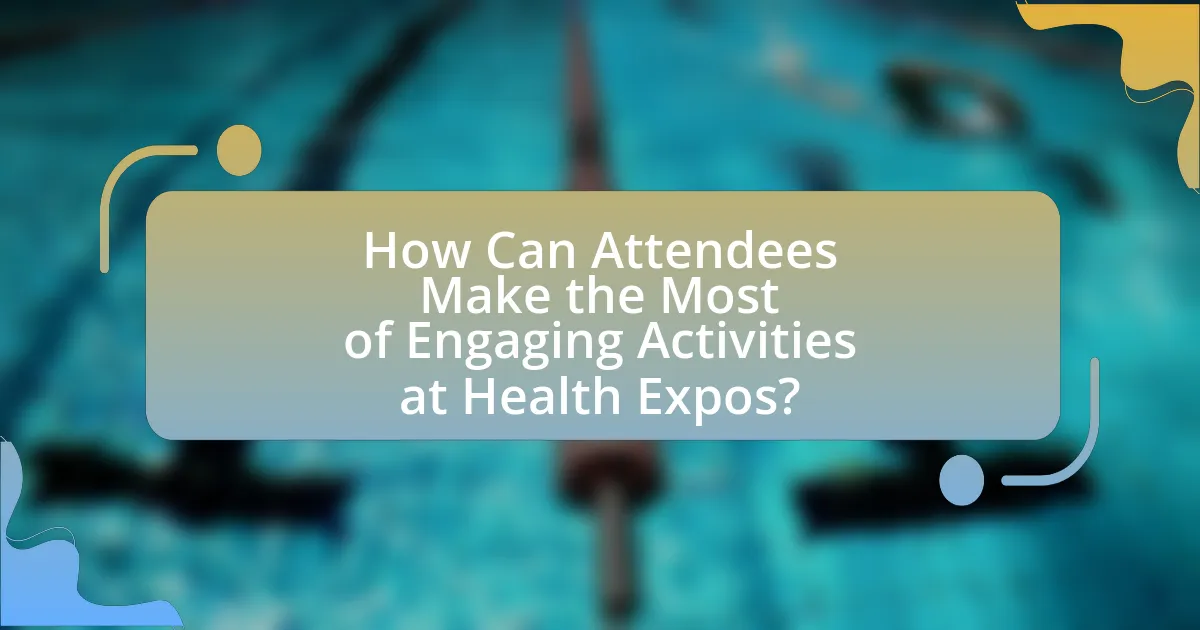
How Can Attendees Make the Most of Engaging Activities at Health Expos?
Attendees can make the most of engaging activities at health expos by actively participating in workshops, demonstrations, and interactive sessions. Engaging in these activities allows attendees to gain hands-on experience and practical knowledge about mental wellness techniques. For instance, studies show that participation in interactive health programs can enhance learning retention by up to 75%, compared to passive observation. Additionally, networking with health professionals and other attendees during these activities fosters community support and shared experiences, which are crucial for mental wellness.
What strategies can enhance participation in activities?
To enhance participation in activities, implementing interactive elements such as hands-on workshops and engaging demonstrations is effective. Research indicates that active involvement increases interest and retention; for instance, a study published in the Journal of Educational Psychology found that participants in interactive settings reported higher satisfaction and engagement levels compared to passive observers. Additionally, providing incentives, such as rewards or recognition for participation, can motivate individuals to engage more fully. According to a report by the National Institute for Health, activities that incorporate social interaction and community-building aspects also significantly boost participation rates.
How can attendees prepare for the activities they want to join?
Attendees can prepare for the activities they want to join by researching the schedule and content of the health expo in advance. This allows them to identify specific sessions or workshops that align with their interests and goals for mental wellness. Additionally, attendees should consider bringing necessary materials, such as notebooks or wellness tools, to enhance their engagement during the activities. Preparing questions or topics for discussion can also facilitate deeper interactions with presenters and other participants.
What should attendees keep in mind to maximize their experience?
Attendees should prioritize active participation to maximize their experience at health expos. Engaging in workshops, discussions, and interactive booths enhances learning and retention of information related to mental wellness. Research indicates that experiential learning, such as hands-on activities, significantly improves knowledge acquisition and application (Kolb, 1984). Additionally, networking with speakers and other participants fosters community support, which is crucial for mental wellness. By focusing on these aspects, attendees can fully benefit from the resources and opportunities available at health expos.
What are some tips for networking during health expos?
To effectively network during health expos, attendees should actively engage with exhibitors and participants by asking questions and sharing insights about mental wellness. This approach fosters meaningful connections and demonstrates genuine interest in the topics presented. Additionally, utilizing social media platforms to connect with speakers and organizations before and after the event can enhance networking opportunities. Research indicates that personal interactions at expos can lead to valuable collaborations, as 70% of professionals report that face-to-face meetings are more effective for building relationships.
How can attendees connect with mental health professionals?
Attendees can connect with mental health professionals through scheduled workshops, panel discussions, and networking sessions at health expos. These events typically feature designated areas where mental health experts provide consultations, resources, and information about their services. Additionally, attendees can engage with professionals during Q&A sessions, allowing for direct interaction and personalized advice. Health expos often include booths or tables where mental health organizations offer literature and opportunities for one-on-one conversations, facilitating connections between attendees and professionals in the field.
What are effective ways to follow up after the expo?
Effective ways to follow up after the expo include sending personalized thank-you emails to contacts made during the event. This approach reinforces connections and expresses appreciation, which can enhance relationship-building. Additionally, sharing relevant resources or information discussed at the expo can provide value and keep the conversation going. According to a study by the Event Marketing Institute, 79% of event attendees appreciate follow-up communication, indicating that timely and relevant outreach can significantly improve engagement and foster long-term relationships.
What resources are available for continued mental wellness after the expo?
Resources available for continued mental wellness after the expo include online support groups, mental health apps, and local community workshops. Online support groups, such as those found on platforms like Facebook or Reddit, provide a space for individuals to share experiences and receive peer support. Mental health apps, like Headspace or Calm, offer guided meditations and mindfulness exercises that can be accessed anytime. Additionally, local community workshops often focus on stress management, coping strategies, and wellness practices, providing ongoing education and support. These resources are essential for maintaining mental wellness beyond the expo environment.
How can attendees access ongoing support and activities?
Attendees can access ongoing support and activities through dedicated resource booths and workshops available at health expos. These booths typically provide information on local mental health services, support groups, and wellness programs. Additionally, workshops often include interactive sessions led by mental health professionals, offering practical tools and strategies for attendees to implement in their daily lives. This structure ensures that participants have continuous access to valuable resources and community support throughout the event.
What are some recommended practices for maintaining mental wellness post-expo?
To maintain mental wellness post-expo, individuals should engage in regular self-care practices, such as mindfulness meditation, physical exercise, and social interaction. Mindfulness meditation has been shown to reduce stress and improve emotional regulation, making it a beneficial practice after the stimulating environment of an expo. Physical exercise, supported by research from the Mayo Clinic, indicates that even moderate activity can enhance mood and reduce anxiety. Additionally, reconnecting with friends or family can provide emotional support and foster a sense of belonging, which is crucial for mental health recovery after an event.
